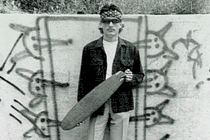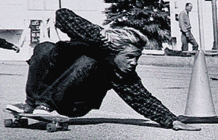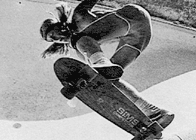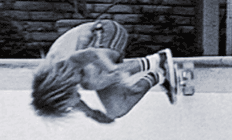SKATE RATS FOR LIFE
Shredding the pools of the rich and famous
  |
  |
|
Photos, clockwise from top left: Nathan Pratt; J. Adams skating on Bicknell Hill; Tony Alva; and Stacey Peralta. |
If you were a teenage boy growing up in the ’80s, chances are you knew who Stacey Peralta was. Or at least, you knew what a "Peralta" was, just like you knew what an "Alva" was, because at some point you convinced your parents that you had to have a skateboard, and then all that was left to decide was which brand to buy.
Once you got your hands on the board, you probably even heard stories about Dogtown, the birthplace of the names branded across the bottom of your deck. Dogtown was a neighborhood, a run-down section of Venice, CA. But it was also the "trademark" of a group of reckless, thrill-riding kids from the ’70s who took a gimmicky fad called skateboarding and turned it into the stuff legends are made of. Even if you’d never had the privilege of seeing Stacey Peralta or Tony Alva or Jay Adams skate, you knew enough to speak in reverential tones, because these guys were gods. They were the pioneers who proved that skaters could be every bit as ground-breakingly cool as rock stars.
If the thought that skateboarding would wind up little more than a passing fad for misdirected youth seems shocking now, perhaps then this is the time for skate- legend- turned- filmmaker Stacey Peralta’s upcoming Dogtown and Z-Boys. Set to premiere in early 2001, the documentary promises to be both a reminder and a celebration of the epic heights and disastrous spills of the culture’s formative years. It’s also a coming-of-age story about a group of kids who forever changed the way future generations of teenagers spend their free time.
For Peralta, the process of making the film has been as much a personal revelation as a professional one. "I don’t think the kids today have any idea where skateboarding came from" Peralta says, fresh from screening a rough-cut of his new doc for an audience for the first time. "It came from a bunch of kids who weren’t exactly anointed ‘winners’. Every place we went to when we were kids to do this, we were told to get out. We were constantly reinforced with the negative. ‘What you’re doing stinks! You’re an idiot! You’re a loser!’ And after a while, you start to think, well, okay, I accept that. So to tell this story now really means something."
In telling the story, Peralta has remained true to the outlaw spirit of his early years. When Hollywood picked up on the skateboard revival and came calling, asking Peralta to sell his life rights, he refused. As he explains diplomatically, "It infuriated me. Who the hell is Hollywood to take this story that was so personal to me and all of us?"
Peralta decided it was up to him to tell the stories of his and his friends’s youth as they really happened: "It’s a story that needed to be told by the people [who] were in it – what it was like to break into a backyard pool, get paid to ride a skateboard, throw concrete on people off the Santa Monica pier. [The film’s] about what was expected of you as a kid and how these experiences changed your life." – Tristan Patterson
Dogtown and Z-Boys premiered in the Sundance 2001 Film Festival. For articles on other Sundance 2001 films, see the Winter 2001 issue and our Additional Online Coverage.
VOD CALENDAR


 See the VOD Calendar →
See the VOD Calendar →


